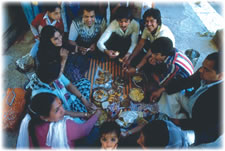
Some rules of etiquette or good manners are different in different communities. For example, belching after a meal is okay in China, but bad manners in the West. Shaking hands is good manners abroad but in India, the traditional Ďnamasteí is favoured. Eating with the fingers is common in our country, but frowned upon elsewhere in the world.
However, good manners have a lot to do with being considerate and sympathetic towards othersí feelings. That is a human value and has little to do with custom. Standing at the back of a lift if you have to get off on the second floor, then pushing your way out, is bad manners. Good manners is a combination of consideration, custom and common sense.
At Home
Home is where you first learn to interact with other people. People feel that one can behave in any way one likes with oneís family members. But that is wrong! Everybody in a household should respect the rights and feelings of everybody else.
Listening: This is important. Whether it is your little sister or your old grandmother, listen to what each family member has to say without interrupting. Donít ignore anyone. On any issue, discuss in a friendly way and then come to a decision.
Respecting privacy: However small your house is, each person has a right to his or her own space.
* Donít open a closed door until you have knocked and waited for permission to enter.
* Donít go through anyone elseís cupboard, desk, box, or papers at home or anywhere else without his permission or in his absence.
* Donít read anyoneís letters or anything he has written (for example, a diary) unless he asks you to.
n Donít discuss the private affairs of your family with outsiders or tell them about a family problem.
Another important part of family good manners is sharing. You share the TV set, telephone and the bathroom and maybe a bedroom, a cupboard or a desk. You share the chores. This means doing your bit, cleaning up after yourself and sharing the responsibility for the safety of everyone in the house.
|






